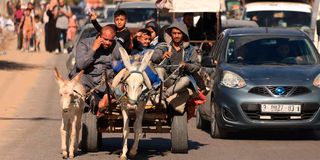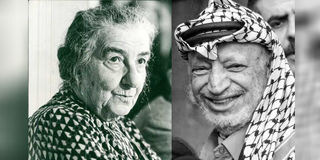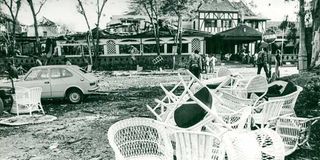
A missile explodes in Gaza City during an Israeli air strike on October 8, 2023.
| AFPWeekly Review
Premium
Costly alliance: How Kenya pays dearly for supporting Israel
What you need to know:
- As a fresh round of violence continues in the volatile Gaza strip, there are concerns President Ruto’s unequivocal backing of Israel over the Palestinians echoes decades of a catch-22 situation Kenya has found itself in, affirming its diplomatic stand but grappling with a security threat.
- From the bombing of the Norfolk Hotel to the terrorist attack on the Israeli-owned Paradise Beach Resort in Kikambala, the country has paid a heavy price for supporting the Jewish state
As President Ruto took sides in the ongoing conflict between Israel and Hamas, Kenyans got worried that, once again, the country had failed to learn from its history and could become a soft target.
Recall this: On December 31, 1980, as revelers were celebrating New Year, a bomb exploded at the Jewish-owned Norfolk Hotel in Nairobi.
It was the work of a West German leftist organisation, Baader-Meinhoff, acting on behalf of the Beirut-based Popular Front for the Liberation of Palestine.
The bomb attack was a response to Kenya’s support to Israel during the Entebbe Raid after the July 1976 hijacking of Air France jetliner, which was diverted to Entebbe, Uganda.
The Palestinian hijackers were demanding the release of some prisoners held in Israel. Unbeknown to many, some of the prisoners had been handed over to Israel by Kenya after they were arrested while trying to bring down an Israeli plane as it approached Embakasi airport.

Riding a donkey-drawn cart as family along with hundreds of other Palestinians carrying their belongings flee following the Israeli army's warning to leave their homes and move south before an expected ground offensive, in Gaza City on October 13, 2023.
Kenya had a long association with Israel – the product of Jomo Kenyatta’s closeness to Golda Meir, whose visit to Kenyatta’s Gatundu home in 1962, when she was Foreign minister, solidified the trust between the two leaders.
Meir, the fourth Israeli prime minister between 1969 to 1974, and Kenyatta had secretly organised the training of several Kanu nominees in Israel in a bid to build an elite security force after Kenya’s independence. Initially, the ties were linked to Tom Mboya who was instrumental in introducing Kenyatta to Israeli contacts.
It is known that after his January 22, 1962, wedding in Nairobi, Mboya flew to Israel for a honeymoon.
Mboya’s two friends organised it: Ehud Avriel and his Nairobi contact, Asher Naim – a man seconded to Kenya before independence to befriend emerging African leaders.

Israeli soldiers move in a convoy at an undisclosed location bordering the Gaza Strip on October 8, 2023.
Naim was Israel’s Honorary Counsel, deputising “Izzy” Israel Somen – a well-known furniture trader and former Nairobi mayor.
The Mboya honeymoon was also combined with politics. On the evening of February 9, 1962, Mboya met with Shimon Peres, a young activist within the Mapai Party. That evening, according to Peres’s biographer Matti Goran, Peres introduced Mboya to West Germany’s Defence Minister Franz Jozef Strauss: “A mountain of a man, 100 kilos-plus, with blue eyes that radiate energy… loves to eat and is a brilliant polemicist”. They discussed politics and how to keep Communists out of Africa.

Former Prime Minister of Israel Golda Meir (left) and former Palestinian leader Yasser Arafat.
According to Goran: “Mboya lectured Strauss on the situation in Kenya and warned of the danger of a complete Soviet takeover by means of local communist groups supported by Moscow.” Israel was ready to help. It was the start of some Mossad activities and training of Kenya’s intelligence – thanks to Mboya.
After Mboya returned, he briefed Kenyatta, and they organised for several Kanu supporters to leave. He had also – with J.M. Kariuki – organised the creation of the National Youth Service to mimic Israel’s Gadna Nahal movement.
The 1967 Six-Day War by Israel against Egypt and Syria and the subsequent occupation of the West Bank, the Arab East Jerusalem (then held by Jordan), and Syria’s Golan Heights, took place when the diplomatic relations between Kenya and Israel were in top gear.
By this time, the NYS was financially supported by Israel, plus various technical and infrastructural projects carried out by Solel Boneh company – by then the face of the Jewish state in Kenya.
Kenya would find itself in a tricky position during the 1973 Arab-Israeli war when all but four African nations under pressure from Arab countries agreed to cut ties with the Jewish state.
Also Read: What we know about Israel's war with Hamas
Although Kenya closed its embassy in Tel Aviv, it continued to have informal relations thanks to the close relationship between its leaders and Israel. It finally restored the diplomatic relations on December 30, 1988.
Since Israel had trained various members of Kenya’s intelligence, it continued to have a rapport with them. When Israel learned that some terrorists wanted to shoot down an El Al plane as it approached Kenya’s Embakasi airport, they tipped the Kenyan intelligence.
The Beirut-based Popular Front for the Liberation of Palestine (PFLP), under the umbrella of the Berlin-based Baader-Meinhoff, had contacted agents of Uganda’s President Idi Amin, who transported missiles from Kampala to Nairobi.
By then, Amin had close ties with Yasser Arafat’s Palestine Liberation Organisation (PLO), the umbrella organisation that represented the Palestinian people’s search for nationhood. In some Western circles, PLO was classified as a terrorist organisation.
The five terrorists, unaware they were under surveillance by Mossad, had applied for Kenyan visas at the British consulate in Beirut. (By then, Britain was managing Kenya’s visa applications in Lebanon). The man behind this mission was Wadie Haddad, a radical Palestinian hijacker and bomber whose group wanted to continue hijacking planes to popularise the Palestinian struggle for a state.
He had fallen out with his boss, Dr George Habash, who felt that hijacking was denting PLO’s image. Habash was popularised in 1973 when Israel forced a Lebanese commercial jet to land in Israel to arrest Dr Habash. He had not boarded the flight, and Lebanon accused Israel of “following the logic of gangsters”.

The shattered wreck of the Norfolk Hotel in Nairobi on January 1, 1981, after a bomb explosion ripped apart the left wing of the building.
On January 21, 1976, Kenya’s Special Branch officers and Mossad counterparts arrested Haddad’s group of two German couples, Brigitte Schultz and Thomas Reuter, and their three Palestinian allies before they shot down the Israeli plane. The security agents seized two Russian-made Strella ground-to-air missiles.
Haddad then sent another German, Monika Hass, traveling on a stolen passport, to investigate the whereabouts of the group: She was arrested at the Nairobi airport. The arrest of this group would lead to the hijacking of the Air France airliner, with Haddad demanding the release of “the prisoners” held by either Kenya or Israel.
Kenya’s Foreign Minister Dr Munyua Waiyaki, said Kenya was not holding any Palestinian prisoners. By then, the Air France plane had been diverted to Entebbe, Uganda, where Idi Amin gave the hijackers moral support.
In Uganda, Haddad’s men allowed the non-Jewish hostages to disembark and held more than 100 Israeli and Jewish passengers.
During this period, senior government officials, led by then-Attorney General Charles Njonjo, connived with Israeli military and intelligence officials and allowed the Kenyan airspace to be used during the rescue of the Israeli hostages held in Uganda.
As it emerged later, some of the planning meetings took place in Njonjo’s Muthaiga home. Others who knew about the plot were Ben Gethi of the General Service Unit and former Cabinet Minister Bruce Mackenzie.
In the dark was Jomo Kenyatta – who was informed after the rescuers had accomplished their mission and were already in Nairobi, according to historian Saul David’s book, Operation Thunderbolt.
The author, relying on Mossad intelligence files, said Gethi woke up Kenyatta at 3am. Beside Gethi was a senior Mossad official, Uri Lubrani. After wincing at Kenyatta’s expletive-laden response, Gethi turned to Lubrani and said: “The President wants you out of Kenya in three hours. Can you do it?”
Also See: Photos - The war in Israel and Gaza

A fireball erupts from an Israeli airstrike in Gaza City on October 9, 2023.
“Yes, we can do it… tell him yes,” replied Lubrani. The wrath of Haddad’s group would emerge in 1980 when one of its members, 34-year-old Muradi Aksali, travelling with a Maltese passport, managed to bomb the Jewish-owned Norfolk Hotel, then owned by Abraham Block’s family.
Why Haddad’s Popular Front decided to retaliate a week after the German couple was released from an Israeli jail was not clear. President Moi was close to the Nairobi Jewish community, and the intelligence cooperation had continued unabated. More so, Moi had become close to Washington and had allowed the US to start a military base in Mombasa.
The 2002 attack on the Paradise Hotel in Kikambala was the later indicator that Kenya would continue to be a soft target of terrorists eager to punish it for continued relations with Israel. Some 13 people were killed. The terrorists had also planned to shoot down Arkia airline as it left Mombasa.
Ten years later in 2012, some two Iranians were arrested in Kenya as they planned to bomb US and Israeli installations.
They had been arrested with 15 kilograms of explosives. Kenya was under pressure from Iran to release the two terrorists – Ahmad Mohammed and Sayed Mousavi – while Israel was pushing for jailing.
While they were finally jailed for 15 years, they would be set free during the Jubilee Kenya Kwanza transition. As another round of war starts between Hamas and Israelis, Kenya’s pro-Israel position echoes that of Western governments.
Whether Kenya has jeopardised its security will remain to be seen – but for previous pro-Israel statements, it has been in the line of fire.
[email protected] @johnkamau1





